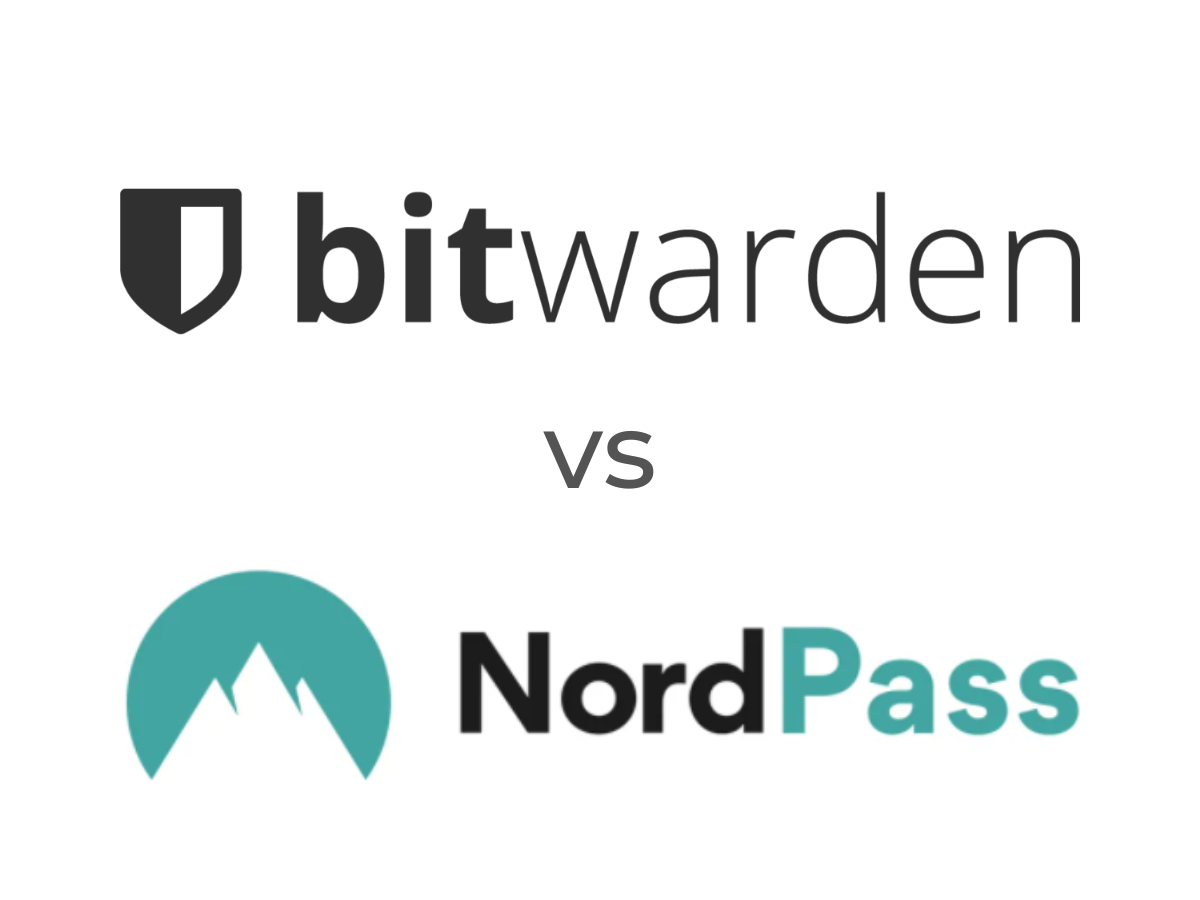Just about every online service requires visitors to create an account, and that typically means more passwords than you can possibly remember. With repetitive passwords considered a poor security practice, using password managers becomes imperative as they help to generate and store complex, unique passwords for each of your accounts.
Among the top password managers on the market are NordPass and Bitwarden. While NordPass is notable for its quality encryption and VPN integration, Bitwarden’s open-source and self-hosting options make it a worthy alternative. But how do you determine which to use? Let’s find out.
Jump to:
- NordPass vs. Bitwarden: Comparison table
- NordPass and Bitwarden pricing
- Feature comparison: NordPass vs. Bitwarden
- NordPass pros and cons
- Bitwarden pros and cons
- Should your organization use NordPass or Bitwarden?
NordPass. Bitwarden: Comparison table
The table below holds a summary of how both password managers stack up against each other.
| NordPass | Bitwarden | |
|---|---|---|
| Our rating | 4.6 stars out of 5 | 4.3 stars out of of 5 |
| Native authenticator app | Yes | Yes |
| Open-source | No | Yes |
| Encryption | Uses XChaCha20 encryption | Uses 256-bit AES encryption |
| Password autofill | Yes | Yes |
| Command Line Interface | No | Yes |
| Free plan available | Yes, (for one device) | Yes (can be used on multiple devices) |
| Built-in VPN | Yes | No |
| Starting price | Paid plan starts at $1.49 per month for two years billing cycle | Price starts at less than $1 per month |
| Free trial | Yes. Offers 30-day NordPass Premium trial and 14-day NordPass Business trial | Yes. Offers 7-day free trial for most plans |
| Visit NordPass | Visit Bitwarden |
NordPass and Bitwarden pricing
NordPass offers the following subscriptions:
Personal & Family:
- Free Plan: Limited features for one user per session and includes a 30-day Premium trial.
- Premium Plan: $1.69/user/month billed annually or $1.29/user/month for two years; includes a 30-day money-back guarantee.
- Family Plan: $2.99/user/month billed annually or $2.49/user/month for two years; includes a 30-day money-back guarantee and supports up to 6 users.
Business:
- Teams: $1.99/user/month billed annually or $1.79/user/month every two years for up to 10 users.
- Business: $3.99/user/month billed annually or $3.59/user/month every two years; supports 5 to 250 users.
- Enterprise: $4.50/user/month billed annually or $4.10/user/month billed every two years; supports unlimited users.
Bitwarden also offers a variety of plans for personal and business use:
Personal:
- Free Plan: This offers limited features but supports use on unlimited devices.
- Premium: $1/month and $10 annually.
- Families: Starts at $3.33/month, $40 annually; suitable for up to 6 users.
Business:
- Teams: From $4/user/month, annually.
- Teams Starter: $20 for 10 users/month.
- Enterprise: From $6/user/month; ideal for large organizations; custom pricing available upon request.
Feature comparison: NordPass vs. Bitwarden
When it comes to features, both NordPass and Bitwarden offer solutions for security, password sharing, encryption and more. I’ve included their standout features below:
Authentication
Both NordPass and Bitwarden offer two-factor authentication (2FA) solutions to add an extra layer of protection for your accounts. NordPass Authenticator uses biometric, possession and knowledge-based authentication methods. Its time-based one-time passwords (TOTPs) expire every 30 seconds and serve as the second login factor you input alongside your password. The Authenticator also comes with QR code scanning and manual key entry options for easy setup.
Bitwarden’s Authenticator also utilizes TOTPs for secure logins and offers options for QR code setup and manual key entry. Everyone can store authenticator keys in Bitwarden, but generating the codes requires a premium account or membership in a paid subscription such as a Families, Teams or Enterprise plan.
Figure A
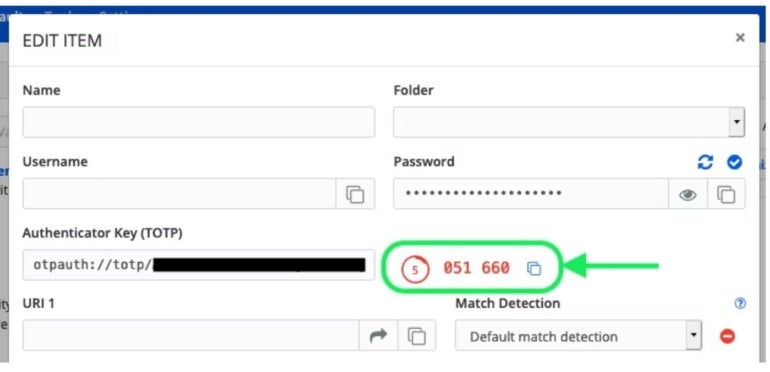
Password import and export
You can import your saved passwords from other password managers like 1Password and LastPass using NordPass on desktop devices or import passwords from browsers using the Android app. Note: To import files into NordPass, you need to organize the CSV file accordingly.
Figure B
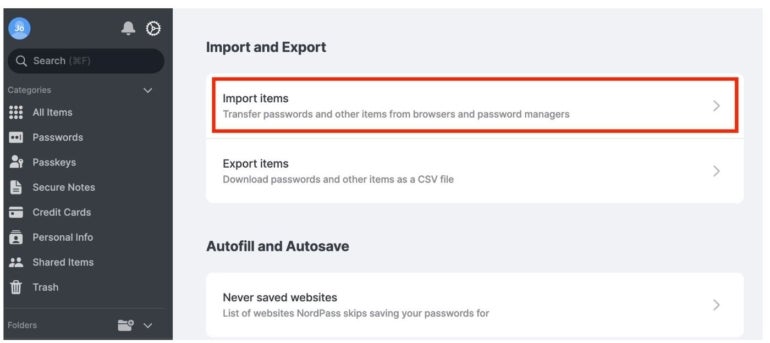
Bitwarden also supports importing and exporting data via its Password Safe in CSV. Data must be imported to Bitwarden from the web vault or Command Line Interface (CLI). In my testing, I found that importing data into the Bitwarden vault does not check for duplicates, so this should be done carefully.
Figure C
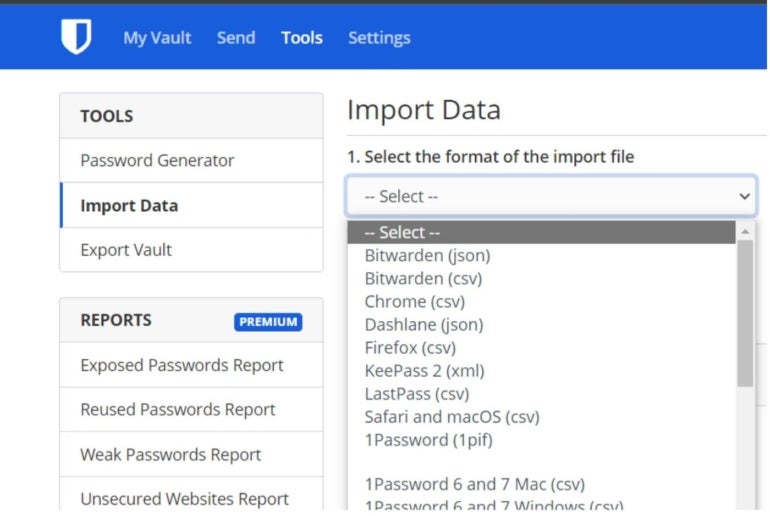
Password sharing
NordPass offers secure password sharing across most of its plans. You can send passwords securely via the NordPass app, or you can use NordPass Sharer, which allows you to safely share passwords or other vital information via a secure link. This secure one-time link is valid for 24 hours, or once opened.
Figure D
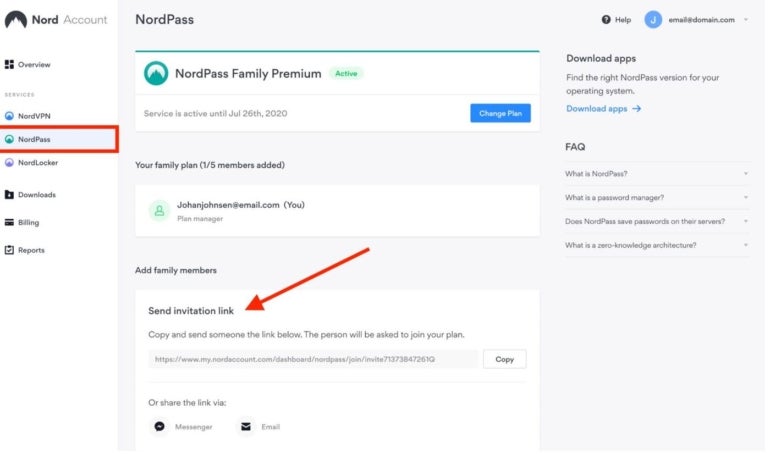
Bitwarden offers two methods for sharing passwords: Bitwarden Organizations for sharing very sensitive information like business accounts, where you create collections and share them with users within your organization, controlling access levels; and Bitwarden Send for less sensitive information like sharing a streaming service account, where you share usernames, passwords and notes. Using this method allows you to control access duration and the number of times your shared item can be accessed.
Security features
NordPass offers multi-factor authentication, which acts as an additional layer of security and prevents unauthorized users from accessing your accounts. It also uses advanced encryption algorithms like XChaCha20 to ensure the security of your vault. Additionally, with NordPass Enterprise, you can take advantage of other security features such as Single Sign-on (SSO), Data Breach Scanner, Password Health and Secure Item Sharing.
Figure E
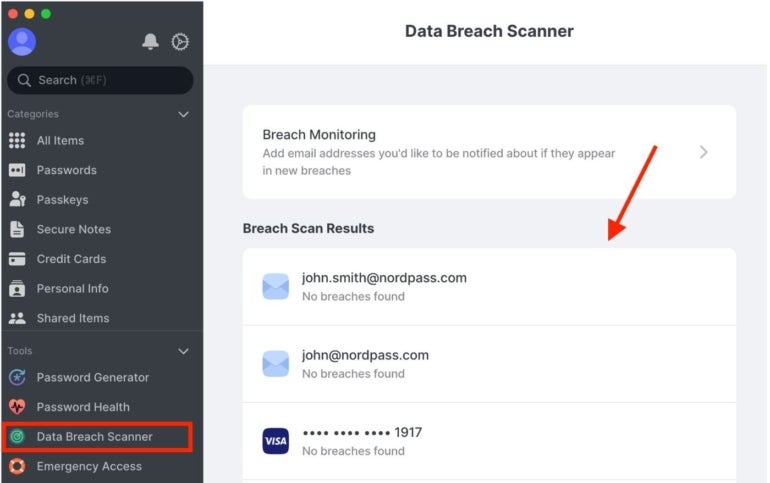
Bitwarden offers open-source security and utilizes the following key security measures to protect user data: AES-CBC 256-bit encryption, PBKDF2 SHA-256 and salted hashing. All cryptography keys are generated and managed by Bitwarden on your devices, and all encryption is done locally. Bitwarden also has vault health reports, offers SSO for Enterprise users and a two-step login using YubiKey OTP, Duo, FIDO2 WebAuthn and the Email and Authentication app.
Automatic device sync
NordPass can automatically back up and sync your credentials and files. This allows you to access your data in the vault from anywhere—whether it’s the app on your phone or a browser extension.
With Bitwarden, items owned by you in the web vault will always remain in sync. Items owned by an organization will sync across users and client applications every 30 minutes. Other Bitwarden apps—such as browser extensions, mobile apps, desktop apps and CLI—will sync automatically at login and regularly when unlocked.
NordPass pros and cons
Pros
- Data Breach Scanner available.
- Viable encryption option.
- Offers a free plan.
- Free trials for most plans.
- Secure password sharing.
- Live chat support.
Cons
- Only one device is supported on the free version.
- The free tier has very limited features.
Bitwarden pros and cons
Pros
- It’s open source.
- Supports both graphical and command-line interfaces.
- One free account can run on multiple devices, although with limited features.
- Advanced two-step login.
- It can be self-hosted or cloud-based.
Cons
- SSO integration and admin password reset are not available in some plans
- Desktop UI requires improvement.
- Only offers a 7-day free trial.
Methodology
I evaluated NordPass and Bitwarden by assessing their user interfaces, security features and ease of use. For real-life experience, I installed the free versions of each app on my Android, Windows devices and Chrome browser. This approach helped me test features like password generation, autofill, responsiveness, lengths of passwords and cross-platform functionality. Both scored well on these benchmarks; however, I noticed that NordPass was faster with its prompts but found it easier to use Bitwarden on my Chrome browser. My assessment also showed that users can generate random strings of digits, letters and symbols of up to 128 characters on Bitwarden compared to NordPass’ 60 characters.
The products’ sites were also taken into account to provide a comprehensive overview of pricing.
Check out our full reviews of NordPass and Bitwarden.
Should your organization use NordPass or Bitwarden?
Choosing between NordPass and Bitwarden depends on your priorities. NordPass offers seamless integration with other Nord products like NordVPN and NordLocker, ensuring a unified security ecosystem for an organizational setting. The interface is user-friendly and simple, and it can integrate with many popular apps and browser extensions. NordPass’ shared folders allow users to securely share information and sensitive data stored in their vaults, making it easier for team collaboration; plus, it includes a data breach scanner on the dashboard for easy password breach scans.
Bitwarden is an open-source security password manager, prioritizing transparency, strong security and customization for budget-conscious individuals or enterprises. It allows self-hosting for advanced users, and it integrates very well with SSO providers like Azure Active Directory and Okta to streamline the log-in process for various team members in an organization.
The pricing for both NordPass and Bitwarden are fairly similar, but Bitwarden offers more flexibility. Its free version offers more features and supports unlimited device connections, unlike NordPass, whose free version supports only one device.
